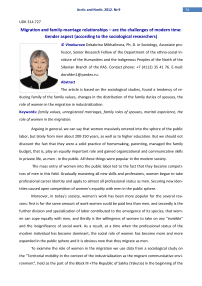Migration and family-marriage relationships – are the challenges of modern time: gender aspect (according to the sociological researchers)
Автор: Vinokurova D.M.
Журнал: Arctic and North @arctic-and-north
Рубрика: Social Sciences
Статья в выпуске: 9, 2012 года.
Бесплатный доступ
The article is based on the sociological studies, found a tendency of reducing family of the family values, changes in the distribution of the family duties of spouses, the role of women in the migration in industrialization.
Family values, unregistered marriages, family roles of spouses, marital experience, the role of women in the migration
Короткий адрес: https://sciup.org/148320387
IDR: 148320387 | УДК: 314.727
Текст научной статьи Migration and family-marriage relationships – are the challenges of modern time: gender aspect (according to the sociological researchers)
Arguing in general, we can say that women massively entered into the sphere of the public labor, but lately from men about 200-250 years, as well as to higher education. But we should not discount the fact that they were a solid practice of homemaking, parenting, managed the family budget, that is, play an equally important role and gained organizational and communicative skills in private life, as men - in the public. All these things were popular in the modern society.
The mass entry of women into the public labor led to the fact that they became competitors of men in this field. Gradually mastering all new skills and professions, women began to take professional career identity and apply to almost all professional status as men. Securing new identities caused open competition of women's equality with men in the public sphere.
Moreover, in today's society, women's work has been more popular for the several reasons: first is for the same amount of work women could be paid less than men, and secondly is the further division and specialization of labor contributed to the emergence of its species, that women can cope equally with men, and thirdly is the willingness of women to take on any "invisible" and the insignificance of social work. As a result, at a time when the professional status of the modern individual has become dominant, the social role of women has become more and more expanded in the public sphere and it is obvious now that they migrate as men.
To examine the role of women in the migration we use data from a sociological study on the "Territorial mobility in the context of the industrialization as the migrant communicative environment", held as the part of the Block III «The Republic of Sakha (Yakutia) in the beginning of the
XXI century: the ethno-social transformation in the conditions of intensive industrial development of the North» Head –Candidate of the historical sciences V.B.Igantiev) (2010-2012). The survey was conducted in December 2010 in the town of Mirny. For primary data collection, respondents were selected by quota of the sampling. The total mass of the 290 respondents (n = 290). Representative error of ± 5%. The sample is characterized by the following socio-demographic characteristics: 18-19-year-old was 7.6%, 20-24-year-olds - 8.3%, 25-29-year-olds - 12.1%, and 30-34-year-olds - 13.1 % 35-39-year-olds - 12.4%, 40-44-year-olds - 12.4%, 45-49-year-olds - 13.4%, 50-54-year-olds - 12.1%, 55-59 - year - 4.5%, 60-64-year-old - 2.8%, 65 and older - 1.4%. Distribution of the national composition: Russian - 61.0%; Yakuts - 20.0% of indigenous peoples of the North -1.0%, other nationalities - 17.9%. The level of education of the respondents in the sample, the following: without education - 0.3% initial, less than 8 classes - 2.1%, lower secondary - 2.4% overall average - 17.2% specialized secondary education (vocational schools, College) - 29.7%, incomplete higher (4th year and above) - 5.9% higher - 41.7%, two or more higher education - 0.3%.
In the context of this article briefly examine what changes occur in the family and in the marriage relationships in the opinion of the respondents in the surveyed cities. To illustrate the use of some data from a previous study on the "Lifestyles and consumption" (supervisor - DM Vinokourov), conducted by the Center Regional Sociology Institute for Human Research of the Republic of Sakha (Yakutia) in 2003-2004. To detect these problems was asked a number of the questions to the respondents by quota sample (n = 556) in the cities Viljujsk, Nyurba, Yakutsk.
From the answers of the respondents belonging to a quota sample (n=556), at the time of the survey, regardless of the registration lived in the conjugal relations of more than half (56.8%) of the respondents. Divorced or widowed, you have interrupted a relationship, it was 31.6% of the respondents. Thus, one way or another with the marriage experience was generally more than 70% of respondents. Of the respondents have a better experience of the marriage, that is, continue to live in the first marriage, more than half - 56.8% repeat their attempts to re-establish a family was 8.7% of the respondents.
Let's see how the respondents evaluate their marriage experience. From the responses, it follows that if the respondent was again in front of a choice, then, of course, they will again be decided on the present its "half" - 37.4% of the respondents, again, would it be a family life, but with the "other / other" - 9.5%, 17.6% of the respondents believe that, first of all, try to make a career, to become independent, and then got a family, 3.2% of the respondents believe that would live an independent life without family, 8.5% of the respondents have ignored this issue, 23.4% of the respondents do not have marital experience.
Thus, more than one-third (38.4%) respondents have a positive experience of marriage and are ready to repeat it again. It is symptomatic that 17.6% of the respondents pushed onto the second place of the family’s values orientation, that is, all put forward the desire to «grasp» the important professional role of models, a career, earn a lot of money, etc. These supplements are extremely radical opinions (3.2%) of the respondents, who feels completely useless entry into marriage.
How do the respondents relate to the very social institution of the marriage, to the fact of the official registration of the marriage. Believe that marriage should always be recorded 44.4% of the respondents before the child is not necessary to register the marriage - 21.0% agree with the opinion that the "why to register the marriage, when you can spend some time together, and then disperse easily if it does not the family "- 19.1%, the rest did not want to answer this question.
The data show that the views of the respondents in the nearly same percentage split: one half of the opposed-law marriages, the other tolerant of the unregistered (civil) marriage.
Consequently, we are seeing a trend of the separation of the social institutions of the family and marriage. Alienation is the official registration of the marriage, that is, the legalization of the actual family relationships, the fact of the cohabitation by one household. The spread of the phenomenon may afford the model of the relations that reproduce the changes achieved through the individual the status when they take more skills to make decisions, but it does not strengthen the social institution of the family. "Legalized" living together, of course, increases the number of decays, the instability of the family relationships, turning them into a tool to achieve certain specific objectives. German scholar Johannes Kopp identified five factors that increase the risk of divorce: reducing investment in marriage, change of marital production, decreased the strength of the social obligations, reducing barriers to divorce and alternatives to improve upon it [1].
Obviously, we can assume that the full significance of the weakening of the family in the eyes of the respondents to some extent evidence of that. Thus, the data obtained to the question "In your opinion, the importance of family, consisting of father, mother and children today are growing or, conversely, decreasing?" They are shown in Table 1.
Table 1 Valuation of the importance of having the complete families by the respondents, in percentages
|
Answers |
% |
|
|
1. |
Yes, today there is the advantage of such a family (both parents and children) |
40,1 |
|
2. |
Apparently, not always live a family, because one spouse often does not work, try to live "in charge" of the wife / husband |
27,5 |
|
3. |
Obviously, family, children hinder a career, earn more money, be creative, etc. |
4,3 |
|
4. |
Now in many ways disadvantageous to have a family, so it is more convenient to have and have only one child, without entering into marriage |
6,7 |
|
5. |
The person needs to have more freedom in the choice of the sexual partner, and this prevents the family life |
1,3 |
|
6. |
Other variants of the answers |
1,2 |
|
7. |
No answers |
18,9 |
According to Table 1, support of the full families 40.1% of the respondents, 27.5% of the respondents are not satisfied with "passivity" of one of the spouses in the livelihoods of the family. As you can see, the couple equally imposes requirements to each other as a "getter". Apparently, this group could be related to a "staggering" because they do not unconditionally accept family value orientation, placing it next to other values. Clearly do not recognize family values rather complete family consisting of a mother, father and children, 6.7% of the respondents preferring incomplete family. Completely reject of the "centrism" of the family, that is, follow-family values, 5.6% (in total) of the respondents.
Of course, the area of today's social relationships, including family, has revamped the loss is still relevant segmental differentiation and stratification, although, of course, they have not disappeared entirely. And it is difficult to imagine that a woman would return to the family hearth, leaving the field of labor. This is illustrated in Table 2.
Table 2
Distribution of the women’s answers, what they did, if their husbands fully financially support their families, in the percentages 1
|
Variants of the answers |
% |
|
|
1. |
Stay at home, do household chores, children |
5,3 |
|
2. |
Settled on a less congested job to spend more time with family, children, himself |
23,8 |
|
3. |
Hardly would stop his career, I can not "work", I have an active character |
14,7 |
|
4. |
I would devote himself fully to his beloved work, the implementation of its long-held dream of what now is not enough time |
9,4 |
|
5. |
No answers |
7,2 |
Thus, the data in Table 2 shows that sitting at home, not to participate in social labor, that is, their traditional way of life, which is typical to 5.3% of women. The rest of the respondents are not willing to end its participation in the public sphere. 38.5% of respondents (in total) one part justifies its participation in social labor as the desire to obtain a livelihood, so another interviewed this need, that does not think of herself out of her.
Interesting to see the attitude of the male respondents to the role of «breadwinner» of their wives. So, ready to take that role and take most of the household chores over 14.6% of the respondents, 3.8% said "My wife now earns more than me, and I support it in all"; 11.2% respondents have traditional views, believing that the wife should do more housework.
1 The remaining share (39,6 %) of the respondents – are men.
In summary, it can be noted that a departure from the traditional notions of the family and marital relations reached such a change, when in a certain part of the identified social consciousness, first, they are perceived not as a primary value, but as a tool to gain access to specific public goods. For example, as a channel for the migrants thrifty consumer devices at entry points. Second, the civil marriage (cohabitation without registration) gradually reducing the responsibility of the couple to each other, children, other family members, also tends to weaken the stability of family relations. Third, if there has been a similar trend, it has implications for all other aspects of life. Clearly, this is an evolution of the relations between the sexes, which are primarily related to family, marriage, etc.
Turning to the presentation of the another part of the problem, briefly outline the demographics of the city, where residents were surveyed (Picture 1).
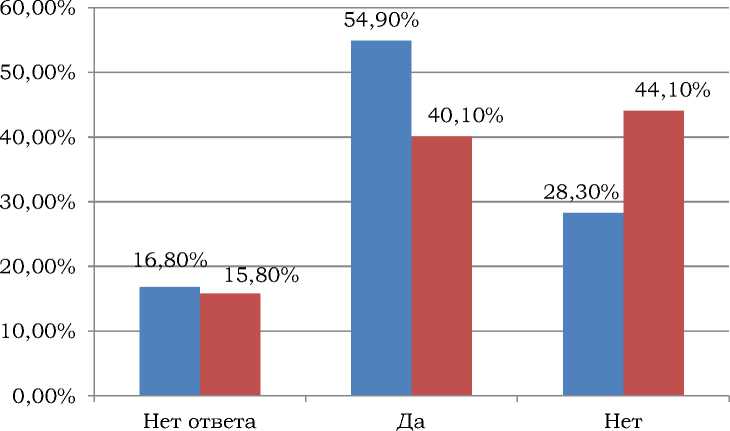
Picture 1. Answers to the question "You can work and earn money but normally it is impossible to live here permanently"
In 1979, according to the All-Union census in living peacefully 56.8 thousand people. Came here from all over the Soviet Union. By 1989, it reached its peak - 86.5 thousand people. However, after the collapse of the USSR it since 1995 gradually went into the decline (83.2 thousand). This is - a gradual outflow of the visiting parts of the population, with a ground breaking property, real estate, slow to get back to preserve their rights to them. We present numerical data loss of the urban population by the year: 2000 - 81.2 thousand people in 2002 - 82.1 thousand people (Russian census) in 2003 - 82.2 thousand people in 2004 - 81.8 thousand people in 2005 - 81.8 thousand people in 2006 - 81.0 thousand people in 2007 - 80.0 thousand people in 2008 - 79.0 thousand people. [1] However, we can not say that this decline is characterized by large "holes", from 2004 to 2006 was characterized by greater stability in the population.
In the post-perestroika period has been a change in the direction of the migration. So, from the 90s international migrants on the one hand, mostly coming from the adjacent or nearby regions of the Russian Federation, on the other -is an increasing proportion of the villagers who come from rural settlements of the republic, or those who just arrived from outside the region, moving from an industrial area to another.
If we turn to a study, the respondents from the rural areas of the country gains 15.9% of the respondents from urban republic -8.6% of the rural areas of the Russian Federation-17.9% of the rural areas of the CIS - 3.1% of the cities of CIS countries - 11.4% did not answer - 32.1% of respondents, some of which may be a native of the city, although this number differs from the previously described (37, 6% indicated that they are natives of the city of peace). Of the share coming from the urban settlements may be the part of those foreign workers, as mentioned above, who moved from the city to the country.
If divided by gender, in the sample of the respondents, the natives of the male – are 32.7%, and Native women - 40.7% of the respondents.
It should be noted that the city of Peace was originally built on the site of the diamond fields of external migrants, so the bulk of the local population began to arrive there in the postperestroika period. Mirniy – is a city with mono production, so the population is very sensitive to any restructuring of the diamond-mining company "ALROSA". Obviously, one cannot ignore the fact that in 1994, opened a branch of the Yakutsk State University. Hence, some of the migrant - is continuing his education the young people who come here for five years, at least, from the surrounding areas. Thus, according to the 2006, for 12 years of the Polytechnic Institute released 865 graduates, including 466 full-time graduates found jobs in different departments "ALROSA". [2]
From what place are coming respondents (men and women)? Are there gender differences in the migration flows? Thus, in the rural areas of the region came 14.2% of men and 16.9 % of women, of the cities in the region -11.5% of men and 6.8% of women in the rural areas of the Russian Federation -12.4% of men and 10.2% of women, of the cities of the Russian Federation -18.6% of men and 17.5% of women, in rural areas of the CIS - 3.5% of men and 2.8% of women, of the cities of the CIS - 12 , 4% of men and 10.7% of women. As you can see, the large spread is observed, except for streams coming from the cities of the country, dominated by men. However, this difference may be due to the arrival of male migrants who arrived in the Republic, and then re-ride from city to city.
So, we can assume that women currently in the migration of peace has increased significantly, which has a beneficial effect both on the demographic structure of the population and its natural growth.
The analysis of the marital status shows that the first marriage is 50.4% of men and 51.4% of women in the second - 11.5% of men and 14.7% of women, in the third - 2.8% of the women surveyed and in the fifth and more - 1.8% of men and 0.6% of women. Children are 64.6% of men and 80.8% of women, do not have children - 24.8% of men and 16.4% of women. As for the other members of the family, almost every second of men (52.2%) was one of the members of his family was one of the family members and 48.0% of the women surveyed. In 2.7% of men survived by his wife, in 1.8% of men and 4.5% of the women interviewed were children. In 37.2% of men and 34.5% of female respondents were parents. In places the outcome remained the parents of one of the spouses in 2.7% of men and 6.8% of the women surveyed. The data show that in the vast city of Mirniy in case family migrants arrive with your family, that is, both spouses.
Maintain the respondents a relationship with the remaining relatives? An affirmative answer was given by 34.5% of men and 32.8% of women; go visit his family during the holidays 12.4% of men and 15.3% of women. Long lost 3.5% of men and 1.1% of women. Thus, the data show that the connection of the exit persist in the majority of the migrants, which means the preservation and the development of their kinship network.
As you know, coming lone workers can create their families at entry. Thus, the question of when a family, had been received:24.8% of men and 30.5% of women came as a family, have entered into the marriage on arrival 29.2% of men and 31.1% of women and did not want to answer this question, almost a third (33.6% men and 31.6% women), never married 12.4% of men and 6.8% of women. The data show that men have a difference of 4.4% between the BEFORE and created his family's arrival in the city of peace, while among women the difference is negligible (1.9%). Apparently, the new location of introduction easier to enter the family and marriage relationships, as the arrival of a new face in the workplace has always attracted more attention, it is possible to select, establish new contacts, etc.
Does this mean that men tend to prefer to enter into a marital relationship at new entry points, because come alone, non-family? Probably due to the expansion of the civil forms of the marriage have more opportunities to live together with different duration of time. The national composition of the family members of the same nationality in 63.7% of men and 66.7% of women, of different nationalities - from 20.4% of men and 26.6% of women. According to the survey, 6.2% of men and 7.9% of women are in a common law marriage.
Thus, the above data shows that some of the migrants interviewed in the places outcome have relatives and family members with whom they keep in touch. Part arrived in the city of peace came into family and the marriage relationships on the arrival at the place of their choice.
So what attracts migrants to the city of Mirniy? As the data in Figure 1, male respondents (54.90%) more than women, tend to view the city as a place to earn money, but it is impossible to live permanently. Opinion of female respondents divided almost equally. This obviously indicates that they are set somewhat deviating from male respondents. They seem to start a family, furnished their living conditions, the name of the children turn to other issues that they care about and more interested than men.
In favor of this statement presents data in Figure 2. The data show that the degree of every three respondents working women and one other man. In other embodiments, the large spread between the responses of men and women was observed. But still left unanswered on the question more women (41.80%).
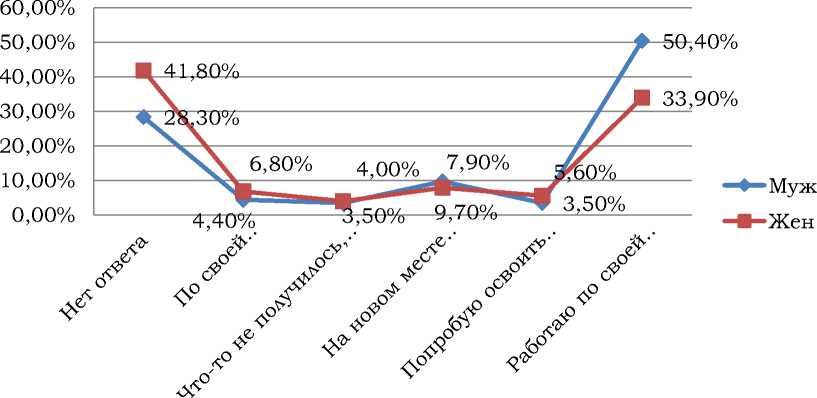
Figure 2. Answers to the question, whether the respondents have changed their specialty in the new location
Now make a comparison between the respondents, with what cannot be reconciled in entry workers (Figure 3). Here and later assumed the answer of the respondent to agree or disagree with the above statements in the questionnaire.
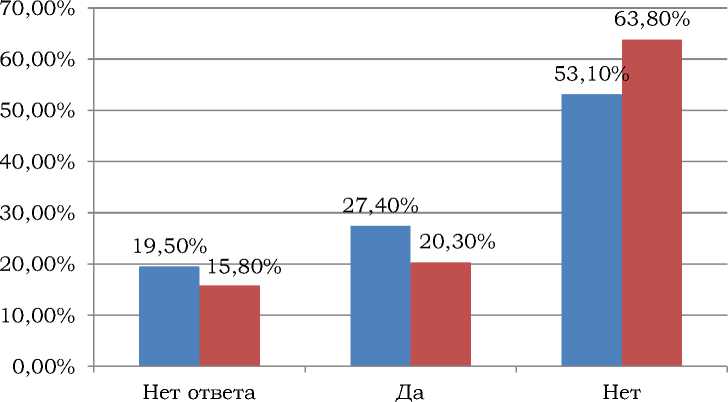
Figure 3. Answers to the question "In the way of the life of the local population is particularly that I find it hard to accept "[3]
So, more implacable are men, who were interviewed. Women were more tolerant to other people's features. By the way, women in daily life often have to get in touch with the local community in addition to occupational areas. Thus, if children attend pre-school or school, usually in parent-teacher meetings or other events attended by more mothers than fathers, or some of the women involved in the network form of distribution of cosmetics, medicines and the like, which involves expansion scope of communication with the local community.
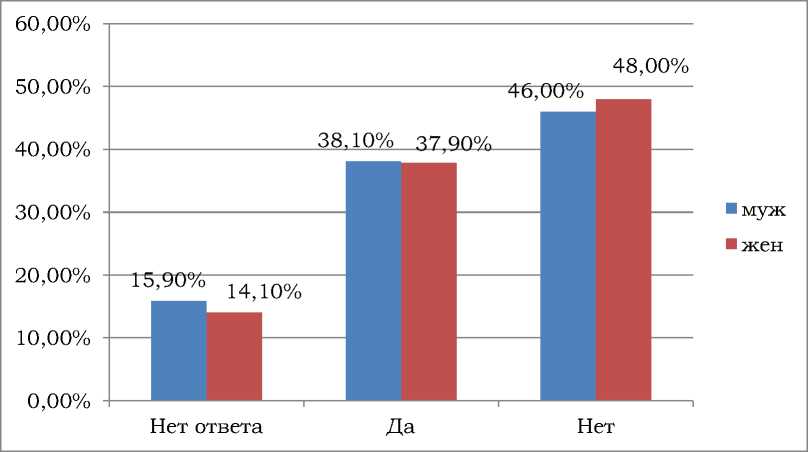
Figure 4. Answers to the question "Here we have to strive to live like everybody"
Certainly more frequent communication on a variety of issues with the local community promotes integration and understanding that each ethnic group its own characteristics. Quite indicative submitted the answers given in Figure 4. Although, of course, argue that most of the interviewed men and women do not accept the rules and regulations of the community, only the responses to one question it would be incorrect. But first it can probably be noted that the "do not accept, because I do not intend to stay here for long.
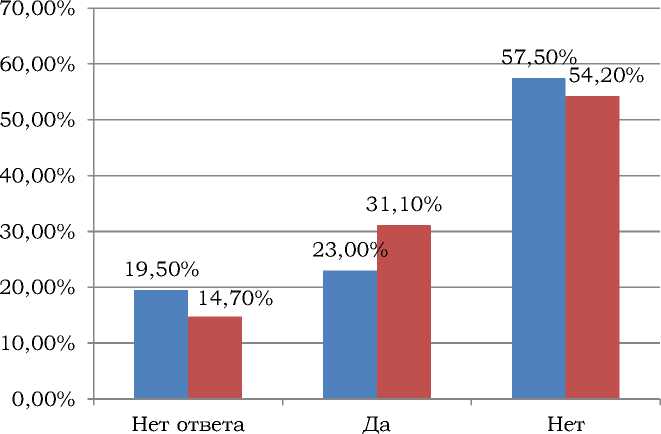
муж жен
Figure 5. Answers to the question "I would like my children or grandchildren are indigenous residents of the republic»
In favor of this, obviously, by the data shown in Figure 5. Even fewer had going "to take root here," and the male respondents (23.0%) the least. These findings are supported by the answers to the direct question of the migration intentions in the future (Table 2). And on the basis of sex intention to change permanently the large spread in the answers of the respondents are not observed.
Table 2
Migration intentions of the respondents, in percentage
|
№ |
Migration intentions |
Gender |
|
|
male |
female |
||
|
1 |
Yes, surely I will go |
31,9 |
31,1 |
|
2 |
I will go, if I have an opportunity |
40,7 |
35,0 |
|
3 |
Скорее нет, чем да |
1,8 |
9,0 |
|
4 |
Rather no, than yes |
3,5 |
10,2 |
|
5 |
I don’t know, I never think about this |
16,8 |
13,6 |
|
6 |
No answer |
5,3 |
1,1 |
Clearly, based on these data, it can be argued that on the base of the industrialization when a certain level of the infrastructure development, the share of women in the migration is almost the same rate as men .
How justify the respondents their desire to change the permanent residence? To the direct question of why they are going to leave, it was following distribution of answers, which is shown in the Table 3.
The spread of the phenomenon may meet the trend, which reproduces the changes achieved through the individual the status when they take more skills to make decisions, but it does not enhance the social institution of the family. "Legalized" living together, of course, increases the number of decays, the instability of family relationships, turning them into an instrument to achieve some specific goals;
Findings support of the participation of women in the migration process of the industrialization in that they reach almost the same level as men;
Unlike men, women respondents were more inclined to base their migratory intentions of the external factors such as harsh climate, reuniting with family and other reasons, while male respondents - the emotional and psychological, "here is unbearable to me," pulling in their homes, the original plans etc.
Список литературы Migration and family-marriage relationships – are the challenges of modern time: gender aspect (according to the sociological researchers)
- Hull C. Measure twice ... The empirical study of the effect of living together before marriage on the risk of divorce / Modern German Sociology: the 1990s. / Ed. Vladimir Kozlovsky, E. Lange, H. Harbaha. SPb.: Sociological Society. M. Kovalevsky, 2002. p. 389.
- Yakutsk State University named after M. Ammosova 1956-2006 g. Anniversary edition. Yakutsk, 2006. p. 155-156.
- Possible answers this question in adapted form, taken from the book.: Kuznetsov, IM Mukomel VI adaptive capacity and networking of migrant ethnic minorities. M., 2005. Pp. 43-44.

